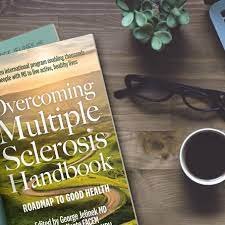Mastering Your MS: Diet
I’m going to let you in on a little secret. I love good food, alcohol, Twizzlers (red liquorice)…and chocolate. But when I was told I had MS I faced a stark choice – to either leave my disease in the hands of fate and Big Pharma or throw off the mantle of victimhood, take action and go on a super strict diet that might help reverse my MS symptoms (or at least put them into remission). I chose to take action. I told myself that the disease-modifying drugs I was taking were a short-term solution and that I had to do whatever it takes to find a cure. And the first step on that pathway was to change my eating habits.
At the time there were a number of MS diets to choose from: Swank, McDougall, Paleo, Mediterranean, Hyperbolic/Caloric Restriction, Best Bet, the Wahls protocol – and I’ll talk about some of these in more detail later on. The diet I eventually settled on was called the Overcoming MS (OMS) diet and it was developed by Professor George Jelinek, a distinguished medical doctor and researcher from Melbourne, Australia who was himself diagnosed with MS when he was 45. He figured out that if you ate a plant-based, wholefood diet (basically vegan with the addition of seafood), you could drastically lower your intake of saturated fats and this would stall the development of MS (check out his Overcoming Multiple Sclerosis Handbook for more info). Adhering to his diet plan meant I had to give up virtually everything I craved – dairy, meat, sweet treats etc.
So I went all in and religiously stuck to the diet for the next seven years. I exercised daily, got plenty of sunlight and loaded up on flaxseed oil for additional Omega-3. I became a certified health nut and took my own food out to dinner parties so I wouldn’t be any trouble for my hosts. I read everything I could lay my hands on regarding MS, nutrition, the immune system and the gut microbiome.
And yep, for seven years not a single chocolate bar or sweet treat passed my lips. Of course, the question everyone asks me is, how did you do it? How did you cultivate the willpower and resilience to stick to such a strict diet while living in a world full of abundance and temptation, feeding your family regular meals and fighting a brain trained to be addicted to sugar and fat since childhood?
And the simple answer is, I flipped my perception around what a diet means. You see, one of the reasons I chose the OMS diet (other than the research suggested it produced the best results) was that prior to going on it, Dr. Jelnick and his team invited me to attend a week-long course at the Gawler Foundation just outside of Melbourne. This course not only explained the science behind the diet but also dealt with all the motivations and mindset around eating, health and nutrition.
Our little group practised meditation every morning, we did chi gong and tai chi, we participated in fire ceremonies and burnt letters we’d written to ourselves in order to let go of past traumas. We learnt that we don’t just eat to satisfy our nutritional needs, we eat because we are driven by our cravings, our emotions, our moods, our family and cultural history. We eat to reward ourselves in the good times and to fortify ourselves against sadness, depression and loneliness in the bad times. And we were told that if we didn’t recognise and deal with these triggers (ie learn to balance our pleasures and pains), then most of us would eventually come unstuck in the long term.
One of the best pieces of advice they gave us was to not focus on what we couldn’t eat, but rather focus on the abundance we could eat. After all, if we went through life upset and angry about what we couldn’t have all the time, we’d be constantly unhappy. So a big part of the retreat was working with chefs who’d prepare delicious food using ingredients from our diet plan and then talking through how to enjoy and embrace the change in lifestyle. Because ultimately, it was a privilege to be presented with this opportunity to change the trajectory of our disease and our lives and avoid the disability looming in our immediate future. And we needed to recognise, acknowledge and be grateful for this.
I also found that being on the OMS diet gave me back some semblance of control over my life, at a time when MS was taking so much control away from me and the medical establishment’s only option seemed to be drugs that might help me (if I was lucky) but wouldn’t cure me. I lost count of how many times I was told to stop wasting my time pursuing alternative treatments because there was no cure and it wouldn’t make any difference anyway.
And yet here I was, surrounded by a bunch of supportive professionals saying, yes diet does make a huge difference and holding up Dr. Jelnick and dozens of his patients as proof of concept (Dr. Jelnick is still symptom-free and leading a normal life 25 years on). Remember, this was 2000, long before Dr Wahls’ breakthrough TED Talk ‘Minding your Mitochondria’ went viral on social media in 2011 and changed everything about the approach to MS care and treatment.
So did the diet make a difference for me after the seven years? Yes, absolutely. It stopped me from having any serious relapses, I felt less fatigued, less depressed and healthier, happier and stronger overall. More importantly I felt empowered, like I was in the driver’s seat, doing something positive to help protect my brain and body.
Keep in mind a big part of every auto-immune disease is dealing with the dis-ease you have with yourself, your body and your situation. The resulting stress/cascade of negative thoughts can then trigger more attacks, resulting in a vicious downward spiral until you eventually give up hope of ever getting better.
A therapeutic MS diet offers an opportunity to break that cycle and reset the mind, the gut and the immune system. Now, if you ask me whether the OMS diet reversed or dramatically improved my symptoms…well, maybe a little, but honestly not enough to satisfy my goal of a cure. It took a few more medical interventions and therapies for that to happen (at least for me). But as far as I am concerned, therapeutic MS diets can be an amazing first line of defense and they can act as powerful ammunition against depression, negativity, stress and fatigue. And yes, for some people, it can be life-changing and miraculous and provide long-term remission.
Okay, so let’s take a closer look at some of the best MS diets currently available based on the latest research. And more importantly, which ones are the easiest to stick to.
Several large studies of the effects of diet on MS came to the conclusion that two diets in particular were associated with significant improvement in quality of life for MS sufferers: the Paleolithic Diet and the Mediterranean Diet (with the Paleolithic Diet coming out on top – not surprising considering the diet removes three of the most common food antigens - gluten, casein, and egg albumin - that cause excessive activation of the immune system).
Both the Swank and Wahls diets were also associated with significant reductions in fatigue, depression and improved quality of life, even for people with progressive MS. The Swank Diet is focused on high-fibre, cutting out saturated fats and eating more fish while the Wahls Diet is basically a version of the Paleo diet. However, only the OMS diet was associated with a significantly lower risk of having severe disability (as well as all of the above benefits).
More importantly, in two major studies, more people stuck with the OMS diet than any other MS diet, and that meant better long term outcomes (OMS dieters reported a 29% lower risk of fatigue and a 57% reduced risk of severe MS disability 0Wow!).
This suggests that important elements of the OMS diet, like low saturated fat and omega-3 supplementation, seem to dampen down the effect white blood cells have on the inflammatory response and reset the immune system towards an anti-inflammatory setting.
Finally, there’s more and more evidence that high-fibre MS diets, like the Swank Diet and the Wahls Diet, reduce gut inflammation, which in turn help fight MS. New research suggests that a bacterial imbalance in the intestines may trigger a dysfunctional immune response, resulting in multiple sclerosis, as well as other diseases like cancer, diabetes, Parkinson’s and even Alzheimer’s.
In fact, people with MS seem to have an abundance of two particular types of bacteria (Aciinetobacter and Akkermansia) , rare among healthy people, that seem to activate specific immune cells known to promote an immune attack. A high-fibre diet restores this balance and prevents enzymes being released by these bacteria that cause gut inflammation.
And that brings me to my last MS Diet, the Best Bet Diet. There’s lots of hype around this diet, thanks to Matt Embry’s Netflix documentary Living Proof (the actual diet was developed by Matt’s dad, Ashton in the late 90s). However, most of the proof that it works long term is anecdotal, rather than scientific (Matt himself has been in remission now for over 25 years and many others claim a similar path of recovery).
The diet is based around preventing certain food proteins from being leaked into the bloodstream via leaky gut syndrome, in order to avoid an immune response that ends with an attack on the myelin around the nerve fibres in the brain (which the food proteins apparently resemble). Dr. Terry Wahls, who developed her own MS diet, was an early proponent of Ashton’s holistic diet and lifestyle approach to MS. Although it remains to be proved whether the improvements from the Best Bet Diet are due to minimising food proteins or perhaps some other interaction in the gut, the message of hope is still the same, hence the name of Matt’s website, MS Hope.
MS doesn’t have to be a one-way, downhill progression. It doesn’t have to be a life sentence. It can be stopped and even reversed with the right treatment therapies, diet and lifestyle changes. Drugs are only a small part of the solution. Embracing the challenge, taking action, throwing off the mantle of victimhood, doing the independent research and listening to your gut instinct (or maybe that should be gut microbiome?) can and will help you survive and thrive with MS. It’s definitely helped me and this year will mark my tenth year in remission from MS following my diagnosis 26 years ago.



